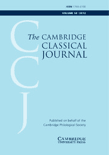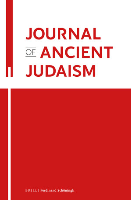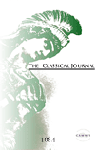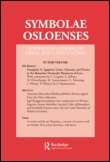
GYMNASIUM
Scope & Guideline
Illuminating Classical Insights for Educational Innovation
Introduction
Aims and Scopes
- Classical Literature and Textual Analysis:
The journal emphasizes the critical examination of ancient texts, including poetry, drama, and epistolary literature, often exploring themes of identity, emotion, and societal norms within the context of Greco-Roman culture. - Historical Contextualization of Ancient Civilizations:
Research published in 'GYMNASIUM' often situates literary works within their historical and cultural frameworks, addressing the political, social, and economic conditions of ancient Rome and Greece. - Interdisciplinary Approaches to Antiquity:
The journal encourages interdisciplinary methodologies, integrating perspectives from archaeology, philosophy, linguistics, and political science to enrich the understanding of ancient texts and their impact. - Cultural Reception and Influence:
Explorations of how classical literature and ideas have influenced later cultures, including post-colonial interpretations and the legacy of antiquity in contemporary thought, are a significant focus. - Gender Studies and Social Constructs:
A growing area of interest within the journal is the exploration of gender roles and identities within ancient texts, analyzing how masculinity and femininity are constructed and represented.
Trending and Emerging
- Migration and Cultural Exchange:
Recent works focus on themes of migration, integration, and the experiences of foreignness in ancient contexts, reflecting contemporary global issues and their historical parallels. - Emotional and Psychological Dimensions of Literature:
There is an increasing emphasis on the exploration of emotions within classical texts, particularly how they relate to politics and personal identity, showcasing a nuanced understanding of ancient perspectives on human experience. - Gender and Identity Studies:
A notable trend is the rising interest in gender constructs and identities in classical literature, with scholars analyzing how texts reflect and shape notions of masculinity and femininity across different periods. - Interdisciplinary Methodologies:
The integration of various disciplines, such as archaeology, philosophy, and cultural studies, is becoming more prominent, leading to innovative approaches that enrich classical scholarship. - Reception Studies of Classical Antiquity:
The exploration of how classical works have been received and reinterpreted throughout history, particularly in modern contexts, is gaining traction, indicating a growing interest in the legacy of antiquity.
Declining or Waning
- Traditional Historical Narratives:
There appears to be a waning interest in conventional historical narratives that strictly chronicle events without critical analysis of their implications or representations in literary works. - Overly Specialized Linguistic Studies:
Research focusing solely on niche linguistic aspects of classical languages without broader contextual application has decreased, suggesting a preference for studies that connect language with cultural or literary analysis. - Studies on Military History:
While military themes were once prevalent, there has been a noticeable decline in publications centered solely on military history, as scholars increasingly prioritize broader socio-political contexts. - Static Cultural Studies:
Research that does not engage with the dynamic interactions between ancient cultures and their modern receptions seems to be less favored, reflecting a shift towards more interactive and comparative approaches.
Similar Journals

Eirene-Studia Graeca et Latina
Discovering Insights from Ancient CivilizationsEirene-Studia Graeca et Latina, ISSN 0046-1628, is a prominent academic journal published by the Institute of Classical Studies, Academy of Sciences of the Czech Republic. Focusing on the fields of Classics, Linguistics, and Archaeology, this journal serves as a vital platform for scholarly discourse and research dissemination since its inception in 2002. Although it operates under a traditional access model, the journal has established itself within the academic community, evidenced by its placement in the Q4 category across multiple disciplines in 2023. This includes significant rankings in areas such as Archaeology and Language and Linguistics, where it finds itself within the 27th to 16th percentiles of its respective categories. Eirene aims to foster the advancement of research in the Humanities, providing a rigorous forum for scholars and practitioners interested in classical studies. Its contribution to the academic landscape is essential for those who aspire to explore the depths of ancient languages, cultures, and methodologies, making it a valuable resource for researchers, professionals, and students alike.

Auster
Bridging disciplines for a richer understanding of humanity.Auster is a prominent open-access journal dedicated to advancing interdisciplinary research within the fields of Humanities and Educational Sciences. Published by the esteemed Universidad Nacional de La Plata, specifically by the Faculty of Humanities and Educational Sciences, this journal has been a cornerstone for scholarly discourse since its establishment in 1996. With an ISSN of 1514-0121 and an E-ISSN of 2346-8890, Auster ensures wide accessibility to innovative research and critical analyses. Its commitment to open access fosters an inclusive academic environment, allowing researchers, students, and professionals in Argentina and beyond to engage with high-quality content that stimulates new ideas and interdisciplinary collaboration. The journal strives to publish timely, relevant articles that explore contemporary challenges in humanities and education, thereby positioning itself as an essential resource for anyone invested in these dynamic fields.

Cambridge Classical Journal
Advancing the Legacy of Classical ScholarshipThe Cambridge Classical Journal, published by Cambridge University Press, is a prestigious academic journal that has been a cornerstone of classical scholarship since its inception in 1884. With a focus on advancing knowledge in the fields of Classics, Linguistics, and Literature and Literary Theory, the journal operates with an annual publication cycle, showcasing cutting-edge research that contributes significantly to these disciplines. With a commendable impact factor and ranking in the top quartile (Q1) for Classics and Q2 for Literature and Literary Theory as of 2023, it remains an essential resource for scholars, students, and professionals alike. The journal's commitment to excellence is evident in its rigorous peer-review process and its role in fostering scholarly dialogue on classical texts and their linguistic and cultural implications. While the Cambridge Classical Journal is not an open-access publication, it is invaluable for anyone seeking to deepen their understanding of the classical world and its enduring influence on contemporary thought.

Exemplaria Classica
Illuminating the Enduring Legacy of the ClassicsExemplaria Classica, published by Universidad de Huelva's Servicio de Publicaciones, is a prominent academic journal dedicated to the fields of Classics and Literature and Literary Theory. Established in 2011, this journal serves as a vital resource for scholars, educators, and students interested in the rich tapestry of classical literature and its enduring influence on contemporary thought. With an ISSN of 1699-3225 and an E-ISSN of 2173-6839, it has firmly established itself in the academic community, although it currently holds a Q4 ranking in both its categories. The journal is ranked #712 out of 1106 in Literature and Literary Theory and #129 out of 170 in Classics as per Scopus rankings, reflecting its emerging status in these fields. Despite its open access designation being currently unclear, Exemplaria Classica is essential for advancing discussions and research in classical studies and has covered a diverse range of topics over its publishing years, making it an important addition to any academic library.

MNEMOSYNE
Nurturing a legacy of excellence in humanities research.MNEMOSYNE is a prestigious academic journal published by BRILL, specializing in the fields of Archeology, Classics, History, Linguistics and Language, and Literature and Literary Theory. With a remarkable history dating back to its inception in 1948, this journal continues to be a crucial resource for scholars and researchers, spanning its publication years that extend to 2024. The journal boasts high rankings in multiple categories according to Scopus, including Q1 status in Classics and History, reflecting its impact and relevance in the academic community. Although it is not an Open Access journal, its selection of peer-reviewed articles ensures rigorous scholarship that contributes to ongoing discussions and discoveries in the humanities. By providing a platform for innovative research and critical discourse, MNEMOSYNE plays an integral role in advancing the understanding of cultural and historical contexts, making it an essential read for both seasoned academics and emerging scholars alike.

Boletim de Estudos Classicos
Exploring the Depths of Classical KnowledgeBoletim de Estudos Clássicos is a distinguished scholarly journal dedicated to the field of Classics and Education, published by COIMBRA UNIV PRESS. Since its transition to an open-access format in 2013, the journal has aimed to broaden the accessibility of high-quality research and critical discussions within these disciplines. Despite its current categorizations in the Q4 quartile for both Classics and Education, the Boletim has a unique opportunity to serve as a platform for emerging voices and innovative research, fostering growth in an otherwise underrepresented area. Based in Portugal, the journal invites contributions that encompass a wide range of topics, from ancient texts and historical analysis to educational methodologies and pedagogy. With an ISSN of 0872-2110 and an E-ISSN of 2183-7260, the journal actively seeks to attract researchers, professionals, and students dedicated to the exploration of classical studies. The journal's address is RUA DA ILHA, NO 1, COIMBRA 3000-214, PORTUGAL, where its contributors and editorial board strive to inspire a deeper understanding of classical heritage and its relevance to contemporary education.

Journal of Ancient Judaism
Illuminating the Cultural Contexts of Ancient JudaismThe Journal of Ancient Judaism is an esteemed academic publication focusing on the dynamic field of religious studies, particularly the historical and cultural contexts of ancient Judaism. Published by BRILL, a reputable international publisher known for its scholarly contributions, this journal is dedicated to advancing the study of ancient Jewish texts, traditions, and their socio-political environments. With an ISSN of 1869-3296 and an E-ISSN of 2196-7954, the journal has established its footprint in the scholarly community, supported by its ranking in the Q3 quartile for Religious Studies in 2023 and a Scopus rank of #371 out of 644 in its category. The content showcased in this journal is vital for researchers, professionals, and students alike, offering peer-reviewed articles that contribute to the broader understanding and appreciation of ancient Jewish heritage and its influence on contemporary religious thought. With a timeline spanning from 2015 to 2024, the journal aims to facilitate rigorous academic discourse and provide open access to vital research findings, fostering a deeper engagement with the complexities of ancient Judaism.

CLASSICAL JOURNAL
Connecting Scholars to the Legacy of Greece and RomeCLASSICAL JOURNAL, published by the esteemed Johns Hopkins University Press, stands as a premier academic platform dedicated to the exploration and analysis of classical studies, focusing on ancient Greek and Roman literature, history, and culture. With an impressive impact factor and categorized in the Q1 quartile for Classics in 2023, the journal provides high-quality, peer-reviewed articles that contribute significantly to our understanding of classical antiquity. Researchers and students from around the globe turn to CLASSICAL JOURNAL for groundbreaking insights, as it consistently ranks in the top tier of its field, occupying rank #52 in the Scopus listings within the Arts and Humanities sector, placing it in the 69th percentile. While the journal maintains a traditional subscription model, its rich content and scholarly relevance make it an essential resource for anyone engaged in the study of the classical world, enhancing the academic discourse surrounding this timeless and influential area of study.

Symbolae Osloenses
Connecting Scholars Through Timeless InsightsSymbolae Osloenses, published by TAYLOR & FRANCIS LTD, is a distinguished journal in the field of Classics, with a rich history dating back to its inception in 1922. This UK-based journal has continuously contributed to the scholarly discourse surrounding ancient cultures, languages, and literature, making it a crucial resource for researchers, educators, and students alike. Though it operates under a subscription model, its impact on the academic community is underscored by its recent inclusion in the 2023 Scopus rankings, where it holds a respectable position in the 65th percentile among its peers. With decades of published research spanning from 1924 to 2023, Symbolae Osloenses remains committed to fostering robust academic dialogue and advancing knowledge in the Classics, catering to a diverse readership seeking to explore the nuances of classical studies.

CLASSICAL ANTIQUITY
Navigating the Intersection of History and LiteratureCLASSICAL ANTIQUITY, published by the University of California Press, is a premier journal dedicated to the rigorous exploration of ancient history, literature, and culture. With an impressive impact factor and ranked #10 out of 170 in the category of Classics within Scopus, this journal stands in the top 94th percentile, signaling its vital role in advancing scholarly conversations in the field. Since its inception in 1982, CLASSICAL ANTIQUITY has fostered in-depth research and critical analysis, making it a cornerstone for scholars, professionals, and students alike. Though it operates on a subscription basis, the journal aims to disseminate comprehensive studies that bridge contemporary perspectives with classical heritage. With a Q1 ranking in the Classics category, it serves as an essential resource for anyone seeking to deepen their understanding of ancient civilizations and their lasting impacts on modern society.